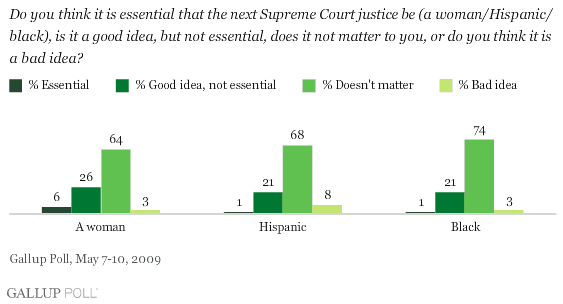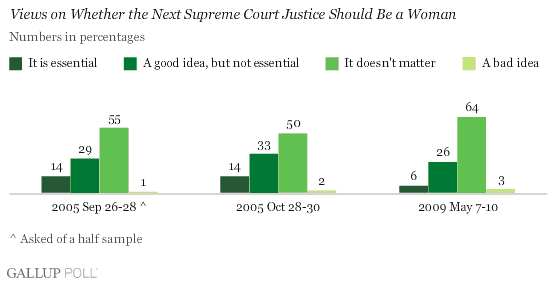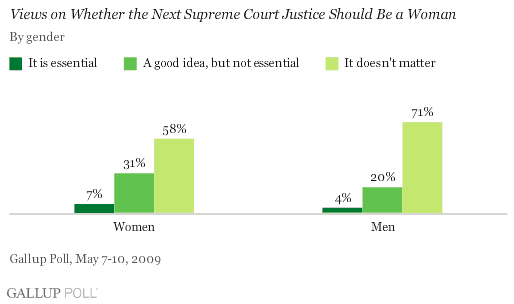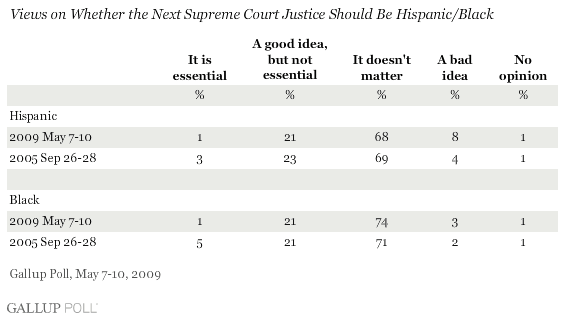PRINCETON, NJ -- Despite the widely reported expectation that President Barack Obama will be looking for a qualified woman -- perhaps from a minority racial or ethnic group -- to fill the seat to be vacated by the retiring Justice David Souter, 64% of Americans say it doesn't matter to them whether Obama appoints a woman, with slightly higher percentages saying the same about the appointment of a black or Hispanic.

Justice Sandra Day O'Connor announced her resignation from the Court in 2005 and was replaced by a man (Samuel Alito), meaning that the Court today includes only one female justice, Ruth Bader Ginsburg, who herself has been battling cancer. As a result, there has been much speculation that President Obama will almost certainly nominate a female justice to avoid the possibility that within the next several years, the Court would have nine male justices. Still, as was the case four years ago, when there were two vacancies on the court (after Chief Justice William Rehnquist passed away and before O'Connor's seat was filled), there is very little demand from the American public that Obama replace Souter with a woman.
Just 6% of Americans say it is "essential" that Obama appoint a woman, while another 26% say it would be "a good idea, but not essential." This combined percentage of 32% is smaller than the 43% and 47%, respectively, who responded in similar fashion in the Gallup Polls conducted in September and October 2005 about O'Connor's prospective replacement.

These 2005 polls, as noted, were conducted at a time of significant turnover on the Supreme Court -- with O'Connor announcing her retirement in the summer of that year, and the death of Rehnquist on Sept. 3. The Senate ultimately confirmed John Roberts as the new chief justice in late September, and after Bush's nomination of Harriet Miers was withdrawn in late October, the Senate took up confirmation hearings on Bush's nomination of Alito, who was ultimately confirmed on Jan. 31, 2006.
In the current poll, women are more likely than men to feel it is important that a woman be the next Supreme Court justice, but not by as large a margin as might be expected. Thirty-eight percent of women say it is essential or a good idea for the next Supreme Court justice to be a woman, compared with 24% of men. However, even with this gender difference, a majority of women (as well as a larger majority of men) say it doesn't matter to them.

There are also partisan differences on this issue, with 26% of Republicans, 28% of independents, and 41% of Democrats saying it is essential or a good idea that the next justice be a woman. But again, a majority of all three groups say it does not matter to them.
There has been very little change over the last four years in the public's feelings about the next justice's being Hispanic or black, demographic characteristics that have also come up in news reports about Obama's contemplations of his choice of justice to replace Souter.

Sixty-eight percent of Americans say it doesn't matter to them whether a Hispanic is appointed, and 74% say it doesn't matter whether a black is appointed. Both of these percentages are roughly the same as Gallup measured in 2005. The Supreme Court currently has one black justice (Clarence Thomas) and has never had a justice of Hispanic ethnicity.
Implications
It is unclear how much the average American knows about the current demographic composition of the Supreme Court. Still, as was the case four years ago, the current results suggest that -- for whatever reason -- there is simply no large groundswell of demand from the American public for the appointment of a new justice who possesses particular demographic characteristics.
By all accounts, there is a high probability that Obama will in fact appoint a woman, and perhaps one who is either black or Hispanic, no doubt in response to his own beliefs and/or pressure from certain interest groups or constituencies. It does not appear, however, that he would need to do so in response to the feelings of the broad constituency of average Americans.
Survey Methods
Results are based on telephone interviews with 1,015 national adults, aged 18 and older, conducted May 7-10, 2009. For results based on the total sample of national adults, one can say with 95% confidence that the maximum margin of sampling error is ±3 percentage points.
Interviews are conducted with respondents on land-line telephones (for respondents with a land-line telephone) and cellular phones (for respondents who are cell-phone only).
In addition to sampling error, question wording and practical difficulties in conducting surveys can introduce error or bias into the findings of public opinion polls.
